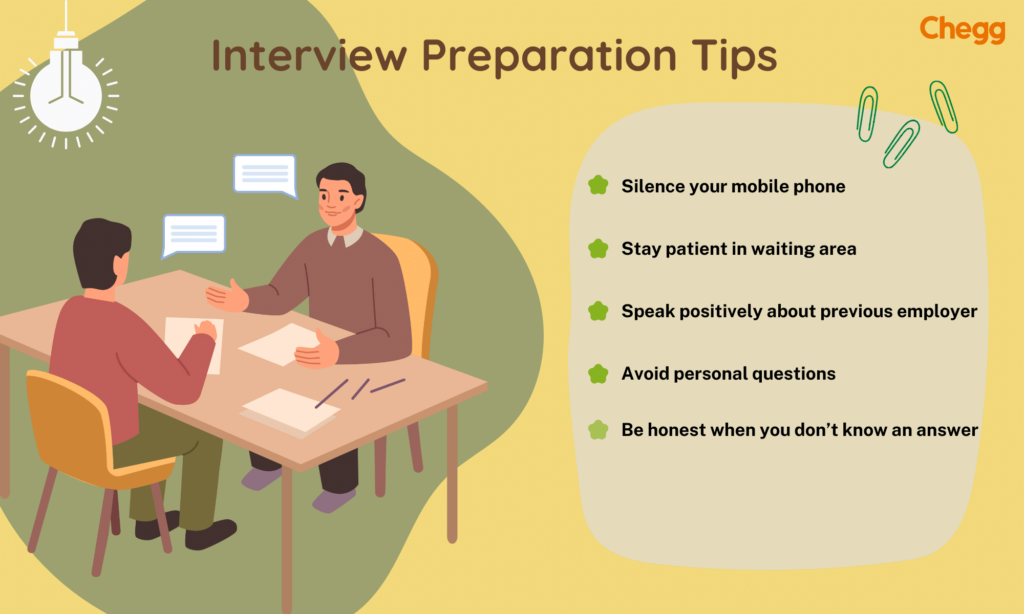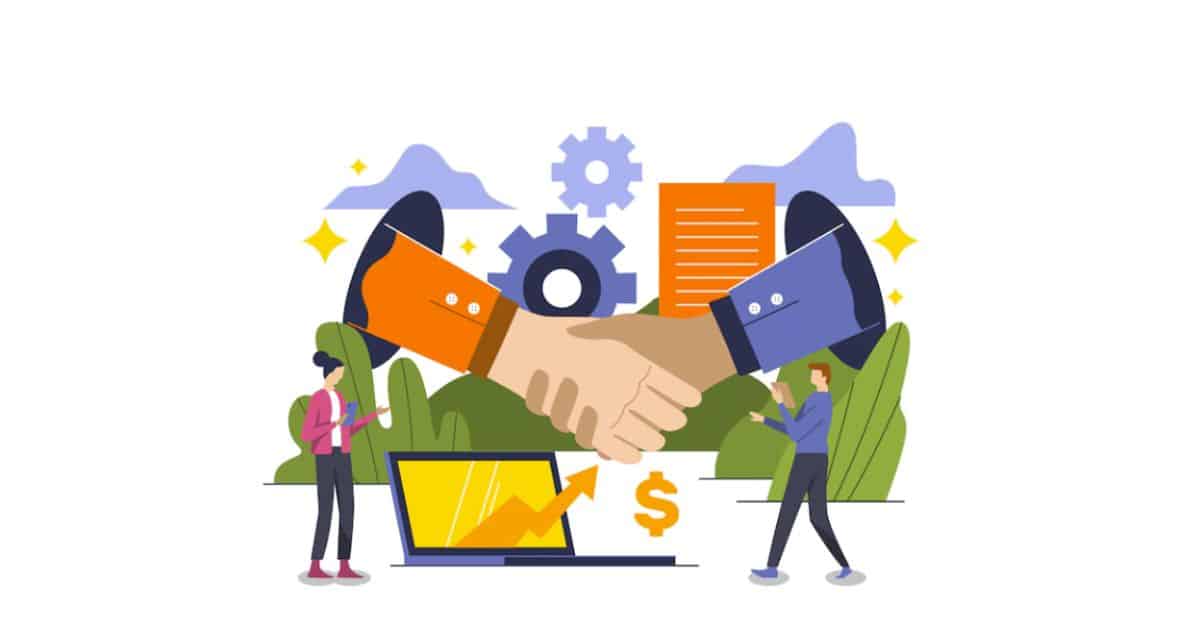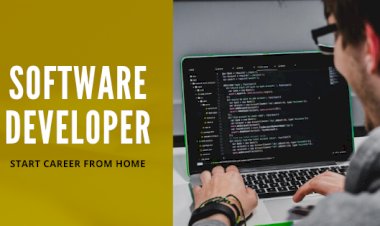Interview Preparation: Top Tips to Ace Your Next Job Interview
Interview preparation is the key to unlocking success in this process. Applying alone won’t get you your desired job. Doing well in the interview is one of the most crucial steps to getting a job. Being prepared can help you stand out from the competition, regardless of experience level. This comprehensive guide on interview preparation […] The post Interview Preparation: Top Tips to Ace Your Next Job Interview appeared first on Chegg India.

Interview preparation is the key to unlocking success in this process. Applying alone won’t get you your desired job. Doing well in the interview is one of the most crucial steps to getting a job. Being prepared can help you stand out from the competition, regardless of experience level.
This comprehensive guide on interview preparation will offer practical advice on everything from pre-interview tactics to interview day etiquette mastery and beyond. These guidelines can help you prepare confidently for your upcoming job interview.
How to Prepare for an Interview
Proper interview preparation demonstrates your commitment and enthusiasm for the role and helps build your confidence. When a candidate is prepared for an interview, it is evident to the interviewers and can make all the difference in the candidate getting the job. Being well-prepared gives you an advantage over other candidates by enabling you to match your abilities with the organisation’s demands.
This comprehensive guide is designed to help job seekers, including freshers, by offering interview preparation tips, exploring different types of interviews, and answering frequently asked questions. You’ll also find information about interview preparation courses and websites that can further help you refine your skills.
Pre-Interview Preparation
1. Review the Job Description
Scrutinize the job description before the interview. Consider how your experience and expertise fit the essential skills and qualifications the organization seeks. Customizing your responses to these terms can make an impression on the hiring manager.
2. Consider Your Eligibility
Determine your qualifications objectively. Consider the value you add to the organization, and be ready to explain how your unique talents may help them achieve their objectives. Making this self-evaluation can also help you feel more confident at the interview.
3. Learn About the Company
Ensure you read the company’s history, goals, values, offerings, and current events. Knowing the organization’s history will help you customize your responses and demonstrate how well your goals align with theirs. You can use this knowledge to your advantage for interview preparation.
4. Prepare a List of Expected Questions
Make a list of frequently asked interview questions, then practice meaningful responses. Get ready to discuss your accomplishments, shortcomings, and motivations for the position. Practising these answers will make you more confident and well-spoken throughout the interview.
5. Practice Mock Interviews
Practising a mock interview with a friend or mentor can help you imitate the real interview setting. By answering questions, you can gain confidence and receive insightful feedback to help you improve your responses.
6. Organize Your Documents
Ensure you have several copies of your cover letter, CV, and other relevant papers (certificates, for example) that may be needed. Keeping things ready and arranged demonstrates your professionalism and level of preparation.
7. Update Your Social Media Profile
Employers frequently form their first opinion of you based on your internet presence. Ensure your social media platforms are professional and consistent with the image you wish to portray, and update your LinkedIn page. This is a crucial step for recent graduates creating their career profiles.
8. Make Travel Arrangements
Make travel arrangements in advance to the interview site. Familiarize yourself with the itinerary, the time, and anticipated delays to ensure you arrive on time. Being on time conveys respect and effective time management.
9. Decide on Your Interview Dress
Choose a professional, polished look that fits the company’s culture. Making a good first impression and demonstrating your seriousness about the opportunity are two benefits of dressing professionally.
Interview Day Preparation
Interview etiquette is equally essential on interview day, just like your answers. From the moment you enter the building, be polite and respectful to everyone you meet, as you never know who might be involved in the decision-making process. Maintaining professionalism and positive body language throughout the interview will project confidence and competence.
1. Reach the Location Early
Make time to unwind, collect your thoughts, and mentally prepare by planning to arrive ten to fifteen minutes early. Arriving early eases anxiety and demonstrates punctuality and regard for the interviewer’s time.
2. Be Polite
Being kind and polite is required as soon as you enter the building. Greet everyone you meet with a smile, and be conscious of your posture. This demonstrates that you are a well-rounded applicant who can blend in with the team environment.
3. Be Mindful of Your Body Language
Your body language shows your confidence. To prevent coming across as defensive, sit up straight, make eye contact, and don’t cross your arms. Your body language will enhance your chances of making a good first impression during the interview.
4. Ask Thoughtful Questions
Get some thought-provoking questions ready to put to the interviewer. This demonstrates that you’ve done your research and are sincerely interested in the business. You can have a big influence by asking about team culture, growth possibilities, and the following steps in the hiring process.
Post Interview
1. Thank You Email: Importance of Sending a Thank-You Email
One of the most important things to do after an interview is to send a thank-you email. It conveys your expertise and gratitude for the chance. Sending this communication to the interviewer within a day shows that you are serious about the position and make a good first impression.
2. Analyze Your Performance
After the interview, examine your answers to the interviewer’s questions and consider how well you conveyed your qualifications. Did you find any questions particularly challenging? Were you able to express yourself clearly? This self-assessment is essential to interview preparation because it guarantees you always improve your strategy.
3. Inform Your References
The employer might contact your references for further verification if your interview went well. It’s crucial to inform your references about the interview, the position you applied for, and any key details they may need to provide accurate and relevant information. Clear communication with your references is part of comprehensive job interview preparation, ensuring they are prepared to advocate for you.
4. Follow Up with HR
If you haven’t received a response within the expected time frame, a polite follow-up with HR is necessary. It shows that you’re still interested in the position. Draft a concise follow-up email that inquires about the status of your application while thanking them once again for the opportunity.
Interview Preparation Tips

1. Silence Your Mobile Phone
Before the interview starts, ensure your mobile phone is turned off or set to silent mode. A ringing or vibrating phone during the interview is a significant distraction and can leave a poor impression. This simple but critical aspect of interview preparation reflects your focus and professionalism.
2. Stay Patient in the Waiting Area
In the waiting area, maintain a calm aura. Avoid fidgeting, as it may convey nervousness. Staying patient while waiting is part of job interview preparation, and it helps you mentally prepare. Use this time to review your key points.
3. Avoid Personal Questions
Refrain from asking the interviewer personal questions. Keep the conversation professional and relevant to the job. Asking personal questions can make the interaction awkward and may reflect poorly on your interview preparation.
4. Keep Answers Short and Focused
During the interview, aim for clarity and conciseness in your responses. Rambling answers can confuse the interviewer, so stay on point and provide relevant information. By practising answering questions during your preparation for interview sessions, you can improve your ability to respond efficiently.
5. Speak Positively About Previous Employers
Regardless of your experience with previous employers, always speak positively about them. Avoid mentioning conflicts or dissatisfaction. This is a fundamental tip covered in job interview preparation, especially in interview preparation courses that teach you how to handle such sensitive topics gracefully.
6. Be Honest When You Don’t Know an Answer
If you don’t know the answer to a question, be honest. Instead of trying to guess or provide inaccurate information, admit that you’re unsure but willing to learn. Taking a moment to think before responding is a standard tip in interview preparation courses.
Types of Interviews
Candidates may encounter several types of interviews during the hiring process. Understanding the nature of the interview allows you to tailor your job interview preparation accordingly. Mastering the specific format is essential whether you’re attending in-person, online, or panel interviews. Here’s an overview of common types of interviews:
1. Phone Interviews
Phone interviews are typically used for initial screenings to assess basic qualifications and interests. These interviews focus on your communication skills and understanding of the role. Preparation for interview phone calls involves having a quiet space, having your resume in front of you, and practising concise answers to common questions.
2. Online Interviews
Online interviews are conducted using Zoom, Skype, or Google Meet. Candidates must have a stable internet connection, a professional background, and appropriate attire. Many interview preparation websites and courses provide tips for mastering this increasingly standard format, especially for remote positions.
3. In-Person Interviews
In-person interviews require on-site meetings at the employer’s premises. This interview facilitates direct communication and a deeper comprehension of the corporate culture. Preparing for in-person interviews involves making travel arrangements, dressing appropriately, and paying attention to body language and professionalism.
4. Panel Interviews
Panel interviews involve multiple interviewers from different departments asking questions to gauge how well you fit the role and company. This format requires preparation for diverse questions and managing interactions with various people
5. Group Interviews
In group interviews, several candidates are interviewed simultaneously. Employers use this format to assess teamwork, communication, and leadership skills. For group interviews, interview preparation websites suggest practising scenarios where you collaborate with others while standing out positively from the group.
6. Behavioural Interviews
Behavioural interviews focus on your past experiences and how you handled specific situations. This format requires detailed preparation for interview questions using the STAR (Situation, Task, Action, Result) method, which many interview preparation courses emphasize.
7. Technical Interviews
Technical interviews assess specific skills related to the job, such as coding for software roles or problem-solving abilities for engineering positions. Candidates are often asked to solve real-time tasks or present their knowledge.
8. Exit Interviews
Exit interviews are conducted when an employee is leaving the company. They are designed to get input on the worker’s experience and pinpoint areas that need work. Even though they are not typically included in the preparation for a job interview, understanding the format can still be helpful.
9. Stress Interviews
Stress interviews test candidates’ handling of pressure and challenging situations. The interviewer may act unfriendly or ask tricky questions to see how well you stay composed. Preparation for these interviews includes practising stress management techniques.
10. Walk-in-Interview
Walk-in interviews are spontaneous and do not require prior appointments. Candidates are expected to show up at a given location and be interviewed on the spot. For walk-in interviews, thorough job interview preparation is key, as you need to be ready to answer questions and present yourself without much notice.
Conclusion
In conclusion, preparing thoroughly for an interview is crucial for distinguishing yourself and landing your desired job. By implementing the practical tips provided in this guide—from strategies to prepare before the interview to perfecting your etiquette on the day—you can enhance your confidence and leave a memorable impression. You’ll be ready to tackle any interview successfully with the proper preparation.
FAQs
1. What is interview preparation?
Interview preparation involves a series of steps for an upcoming job interview. These include reviewing the job description, researching the company, practising common interview questions, organizing documents, and dressing appropriately. Adequate preparation helps boost confidence and ensures you present yourself as a strong candidate. For freshers, interview preparation websites and courses offer valuable resources and guidance tailored to their needs.
2. What are 5 things you should do to prepare for an interview?
1) Review the job description and align your skills with the requirements.
2) Research the company’s mission, culture, and recent developments.
3) Practice mock interviews and frame answers to common questions.
4) Organize essential documents such as your resume and cover letter.
5) Dress professionally and ensure your appearance is neat and presentable.
These are key aspects emphasized in any good job interview preparation course.
3. What are the 5 C’s of interviewing?
The 5 C’s of interviewing are Clarity, Confidence, Control, Concern, and Competence. Clarity refers to clear communication, confidence in self-assurance, control in staying calm under pressure, concern for showing interest in the company, and competence in demonstrating the skills required for the role. Mastering these through thorough preparation for interview strategies will set you apart from other candidates.
4. What is an interview short answer?
A short answer in an interview is a concise yet informative response that directly addresses the interviewer’s question without unnecessary elaboration. It should be clear and concise, demonstrating your ability to communicate effectively. Practising short answers during your job interview preparation ensures that you provide focused and relevant information, as is often recommended by interview preparation websites.
5. What are the types of interviews?
The types of interviews include phone interviews, online interviews, in-person interviews, panel interviews, group interviews, behavioural interviews, technical interviews, exit interviews, stress interviews, and walk-in interviews. Each type requires specific preparation techniques, and many interview preparation courses or interview preparation websites offer tips tailored to these different formats. Understanding the interview type helps you adapt your preparation strategy for better outcomes.
The post Interview Preparation: Top Tips to Ace Your Next Job Interview appeared first on Chegg India.


















/cdn.vox-cdn.com/uploads/chorus_asset/file/25115065/DCD_Avishai_Abrahami.jpg)







